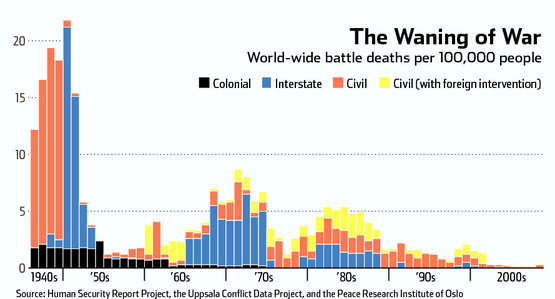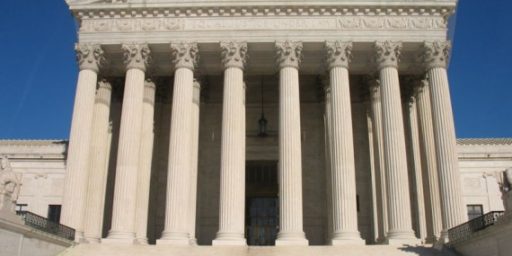What Is The World Coming To?
Better or worse?
 In a mass media environment where we hear about horrible events from all over the world every day, it’s easy to think the world is falling apart. Or at least getting worse. But, according to Harvard Prof. Steven Pinker, the world has been becoming more peaceful and less violent throughout the history of civilization–and continues to do so:
In a mass media environment where we hear about horrible events from all over the world every day, it’s easy to think the world is falling apart. Or at least getting worse. But, according to Harvard Prof. Steven Pinker, the world has been becoming more peaceful and less violent throughout the history of civilization–and continues to do so:
Believe it or not, the world of the past was much worse. Violence has been in decline for thousands of years, and today we may be living in the most peaceable era in the existence of our species….
These investigations show that, on average, about 15% of people in prestate eras died violently, compared to about 3% of the citizens of the earliest states. Tribal violence commonly subsides when a state or empire imposes control over a territory, leading to the various “paxes” (Romana, Islamica, Brittanica and so on) that are familiar to readers of history.
It’s not that the first kings had a benevolent interest in the welfare of their citizens. Just as a farmer tries to prevent his livestock from killing one another, so a ruler will try to keep his subjects from cycles of raiding and feuding. From his point of view, such squabbling is a dead loss—forgone opportunities to extract taxes, tributes, soldiers and slaves….
Another pacifying force has been commerce, a game in which everybody can win. As technological progress allows the exchange of goods and ideas over longer distances and among larger groups of trading partners, other people become more valuable alive than dead. They switch from being targets of demonization and dehumanization to potential partners in reciprocal altruism.
I’ve long thought that the perception that the world is getting worse than in previous generations arises at least in part from the fact that we hear about a lot of tragedies we’d never have known about then. An earthquake across the world that kills hundreds makes the nightly news today. A few centuries ago, if we heard about it at all it would have been months or years later–and wouldn’t have pictures. Now we can follow the tragedy in real time. And, of course, there are a lot more people around to whom such things can happen.
Which is not to say that unrestrained growth of government or even commerce is without its own risks. The newest phase of violence reduction Prof. Pinker identifies is, for instance, a direct result of the collapse of totalitarian communist states. By contrast, China’s one-child policy has created a volatile social environment in which there are millions more men than women, meaning there are vast numbers of of men reaching adulthood and unlikely to find mates. In an earlier era, that would almost certainly have resulted in large scale war. But China’s deep commercial ties to the West make that considerably less likely now.
There are always groups (especially in government and the media) who benefit from the perception that the world is getting more dangerous, not less. And, of course, Prof. Pinker’s conclusions are subject to all of the usual caveats about academic theories and research. But he has provided a healthy dose of perspective.






Pinker’s a bright guy. You might also like:
Political Rhetoric, Explained – Steven Pinker
Or not.
Less large scale war doesn’t per se mean the world is less violent. It may just mean that the violence is smaller scale, insurgencies and gangs as opposed to battalions. Granted gangs tend to do a lot less infrastructure damage, and in that sense this may indicate less damage even if the same number of people are getting killed.
I suspect the rise of communication technology has helped a great deal in reducing military conflicts. So much harded to dehumanize.
@Tlaloc:
Pinker talks about small scale violence quite a lot in his books, including The Blank Slate.
Basically, in unpoliced societies murder is much more common than we (policed) can comprehend.
Don’t tell Communist China it has collapsed, we still need to borrow money from it.*
*See Woody Allen’s joke about his brother who thought he was a chicken in Annie Hall.
What the heck, here it is:
Alvy Singer: [narrating] After that it got pretty late, and we both had to go, but it was great seeing Annie again. I… I realized what a terrific person she was, and… and how much fun it was just knowing her; and I… I, I thought of that old joke, y’know, the, this… this guy goes to a psychiatrist and says, “Doc, uh, my brother’s crazy; he thinks he’s a chicken.” And, uh, the doctor says, “Well, why don’t you turn him in?” The guy says, “I would, but I need the eggs.” Well, I guess that’s pretty much now how I feel about relationships; y’know, they’re totally irrational, and crazy, and absurd, and… but, uh, I guess we keep goin’ through it because, uh, most of us… need the eggs.
I love that the chart starts with the 1940s. Look, things are so much better since the worst conflict of all time ended.
Although, the article reaches much further back into history and makes a convincing argument about why violence has declined and peace has flowered. You’re not gonna like this, Dodd.
Doh!
@Herb:
Why would you think that I wouldn’t like that? There is nothing at all distressing about that sentence. The essential point of government is for it to be the repository of retaliatory force. That’s why we have police, the military, and the courts. Even Ayn Rand recognized the validity of the State’s role in this respect.
It doesn’t follow that the State must necessarily be great at everything else it decides to do. In fact, the overwhelming evidence of history is that the State is very good at violence but not much else.
We should also include a shout-out to the medical community — people are harder to kill nowadays. Things have improved since the days when amputated limbs would pile up outside the medical tents in our civil war. Guys are living who’ve been shot in the head. It’s amazing.
Heh. A thoughtful essay on a thoughtful subject and citing a thoughtful author………….and no Michelle Bachman bashing or Sarah Palin obsession.
Maybe there is still hope for OTB. Thanks, Dodd.
@michael reynolds:
An excellent point, though I think it’s tangential to Pinker’s: That the rate at which people need such assistance is lower.
@Drew:
I live to serve.
While I do enjoy this post brimming with optimism, it brings up relativity. I was born after Vietnam so there was really only one large-scale war effort by the United States, the Gulf War, before 9/11. So having a couple simultaneous wars with billions of dollars flying out the sides seems pretty tumultuous to me, even though I’m not personally affected much.
this reminds me of the disparity between actual crime rates and the public’s perception of crime. even though we see a consistent decline over the last 30+ years, people continuously assume that crime is on an upward swing. it is, after all, a relative question.
The study and conclusions seems reasonable to me.
However to sharp shoot it a bit. Like Herb said starting off with the 1940’s is bogus. His other graph in the article had basically three areas of Europe. The world is much bigger than Europe. Also the data used is inaccurate at best. The history of the world’s population and especially the number of violent deaths is rough deductive estimate. Then there is the question of what constitutes a violent death. If you include abortions then China policies would greatly increase the number of recent violent deaths. The number of deaths even today is a rough estimate. We don’t even have a solid number of violent deaths that occurs in Africa on yearly bases.
Using per 100,000 people technique put it in perspective in some sense but also clouds it as well. In the end 3000 people being killed in country of 300 million at once is still 3000 people being killed. It is but isn’t the same as one person being killed in a city of 100,000.
I touch on this earlier but violence can manifest itself in many forms. The article is a little scary since it results with me agreeing with much of what Herb, Tlaloc and Michael said.
And yet this seems to show an increasing aptitude for a state’s ability to prevent violence, usually to the detriment of civil liberties.
Oh, and the “even Ayn Rand recognized” stuff…..just leave it out. While I expect a Randian to accept the validity of state power viz-a-viz the police, military and courts, I don’t think very many will speak highly of how those resources are used. Prosecuting a criminal? Yes. Mandatory gun registration? NO! See the difference?
@CB
You bring up a good point. It is a matter of who is affected by it as well. For example many crimes have spread to the rural areas because of the mass transit system. In 1200’s a major war in Europe would have gone unnoticed and would have been irrelevant to those in North America. That is no longer true today.
@Herb:
The one doesn’t necessarily follow from the other. A close reading of the article suggests that, after the initial ‘civilizing’ reduction in violence from the creation of the State, the major reductions that follow came through the State (and other authority, i.e., the Church) reducing the means by which it inflicts violence.
I inferred a seriously misapprehension in the comment I was replying to. The same sort that causes people who can’t be bothered to understand what the people they disagree with actually think to assert that Somalia is a libertarian paradise.
So, yes, of course I see the difference. The former is the application of retaliatory force, the latter is a mechanism for depriving citizens of their ability to engage in same.
Don’t get hung up on the chart, Pinker’s claim is much deeper:
It is an idea he has been developing for some time now.
@Dodd:
Tommy guns for everyone?
(I’m too old-school for an Uzi.)
@Wayne:
SHEEP ARE LAYING DOWN WITH LIONS! CATS WITH DOGS! HENS WITH FOXES!
RUN FOR YOUR LIVES!!!
In response to several………………….your right, let’s go back to the good old days. The Romans? Vikings? How about Al-the Great, or Ghengis Khan.
Hold hands now. Kumbaya my lord, kumbaya…………
I have to admit that I am surprised by that graph and would be curious if there has been any peer review of the data.
That aside, I do believe that the loss of life my be less but, it seems to me that the number of conflicts has increased.
What happens when the world powers who because of their might and power are creating a restraint upon man become insolvent and no longer offer that restraint in the current economic climate we find ourselves in?
Could get quite messy.
Nor any Obama and/or liberal bashing, for that matter…hope indeed…
“The former is the application of retaliatory force, the latter is a mechanism for depriving citizens of their ability to engage in same.”
Are you then willing to accept that “depriving citizens of their ability” to use retaliatory force results in less violence?
I mean, earlier you said that the state having “a monopoly on the use of legitimate force” is perfectly consistent with your (and Ayn Rand’s) principles. And yet you seem to be implying here that there’s a “legitimate” use of force that the state isn’t party to, that is, “retaliatory force” between “citizens.” How do you bridge that gap?
Not necessarily. I guess spoke too loosely, if you took my meaning to be that self-defense was perfectly coextensive with retaliation. Where gun control deprives citizens of the ability to defend themselves, it likely produces more violence. The State is the repository of responsive use of force after the threat is no longer immediate.
Everyone has the right to defend themselves from force being used against them in the moment. The difference is between preventing someone from harming you right now and vigilantism later. The State is incapable of adequately supply the former but is the legitimate vessel of the latter. If someone breaks into my house and points a gun at my family, I have every right to shoot him. If I come home and find my house has been broken into, finding and punishing whoever did it is the State’s job.
It’s easy enough to extrapolate that distinction to the more abstract force inherent in the courts (where we settle disputes non-violently with the State’s power backing up such resolutions) and, of course, national defense.
Perhaps, but making people register their guns does not deprive people of their ability to defend themselves. Making them wait a few days, restricting them to one instead of many, banning extended clips, banning assault rifles, all the stuff we think of as “gun control” in this country, none of that deprives people of their ability to defend themselves. It does, however, complicate any nefarious plans one may have.
And it may actually reduce the need to defend yourself.
After all, we live in a world where you’ll only have to defend yourself in the most extraordinary of circumstances. Someone’s breaking into your house, someone’s jacking your car, someone’s mugging you on the street. But even then, in order for your defense to be considered “legitimate” it must survive State scrutiny. They have to sign off on it, call it “self-defense” rather than a crime. The timing of the event is irrelevant.
Back to tommy guns.
This play argument that more guns means more peace dies in real experience, both here and in over-gunned societies. (Afghanistan is a good example of a country with many guns, little gun control, and little law. See also “tribal violence.”)